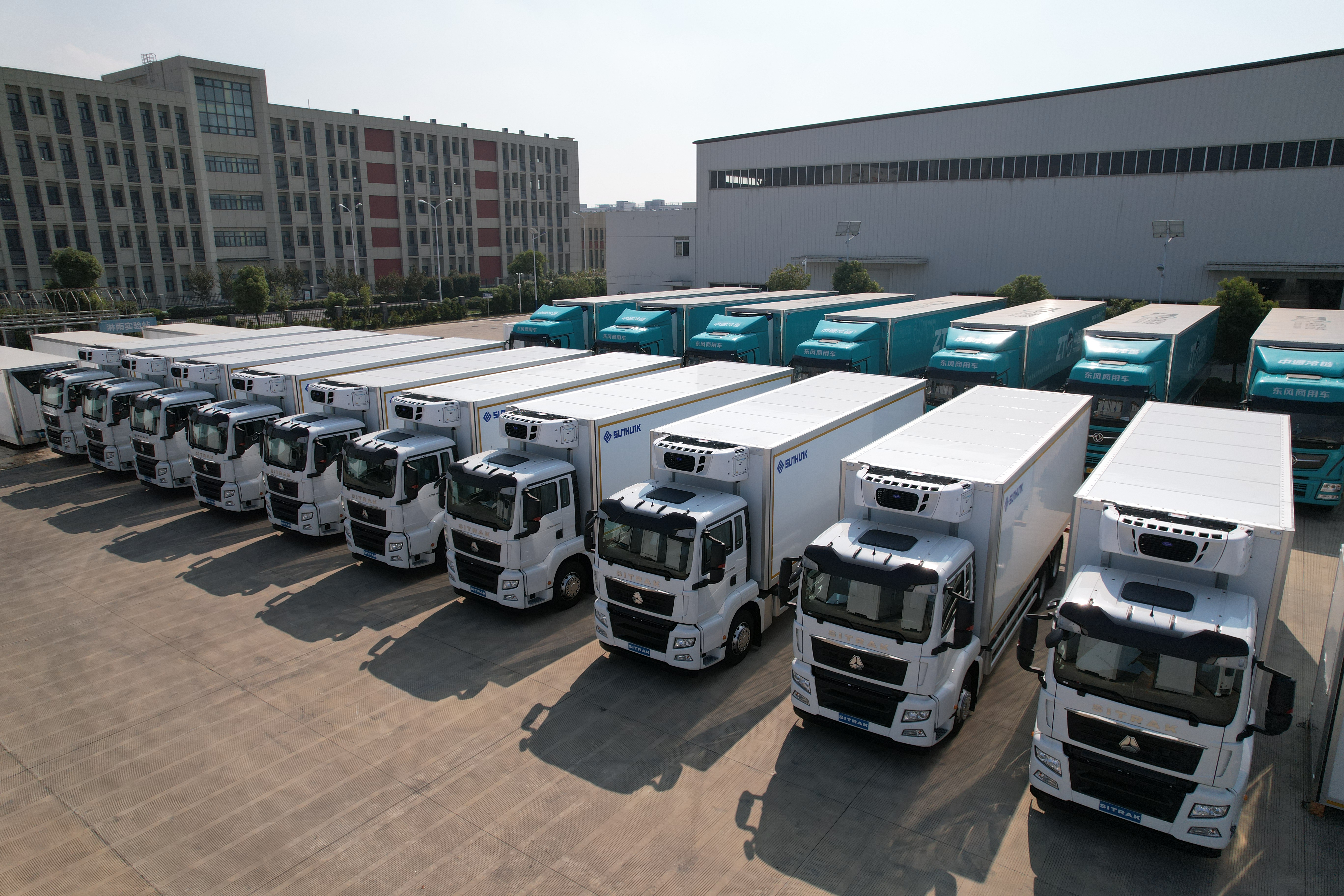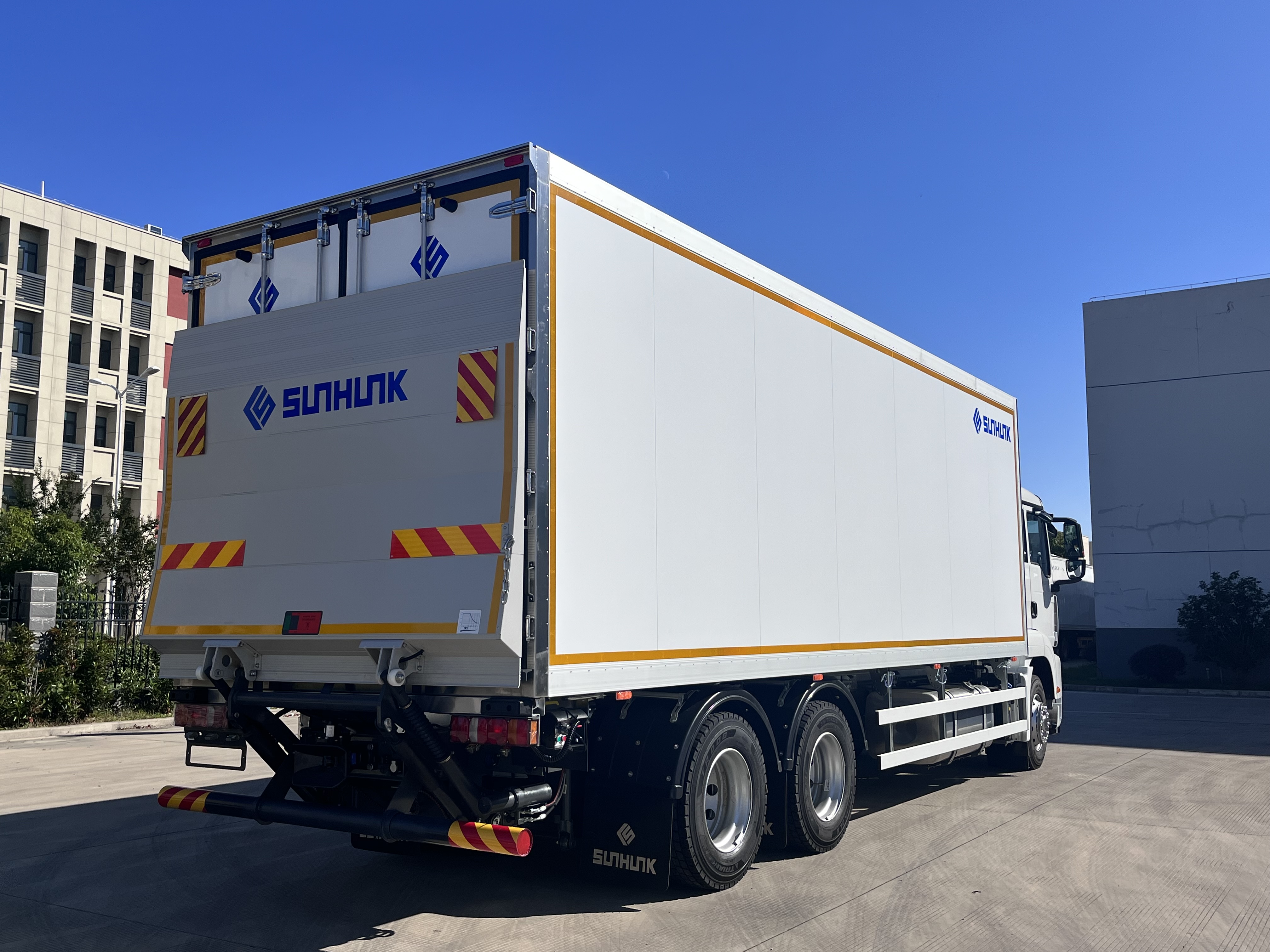- PRODUCTS
- SOLUTION
- SERVICE
- NEWS
- ABOUT US
Reefer trucks are equipped with refrigeration systems, suitable for transporting temperature-sensitive goods such as food and pharmaceuticals, with relatively high maintenance costs. Box trucks, without temperature control, can carry loads up to 35 tons and are suitable for transporting general large items.
These trucks, where temperature control is important serve as refrigerated truck for the most part since shipments can be delicate to temperatures. Box trucks are a lot more flexible space and have higher payload capacity, for that reason box trucks are used almost everywhere to carry different types of goods without having any temperature sensitivity.

Compared to normal trucks, refrigerated trucks are ideal for transporting perishable foods like meat and seafood as well as dairy products or fresh fruits and vegetables. The products are perishable and require a narrow temperature band throughout the journey, not only to enable delivery but also food safety. About 30% of the food items around the world are transported with cold chain systems hourly as well as cooled vehicles become an essential and primary a component being carried out. In 2019, the scale of China cold chain logistics market exceeded 370 billion yuan and is predicted to grow with a CAGR of nearly 10.5% in next five years.
The use of refrigerated trucks in the transportation of pharmaceuticals is also common; Refrigerated trucks make use of modern temperature control technology to refrigerate these products, thus preserving their quality and effectiveness during transportation. When it comes to delivering the COVID-19 vaccines around the world, refrigerated trucks were able to play their part too. It covered more than 60% of COVID-19 vaccines delivered globally, primarily through refrigerated trucks.
The box truck is applicable to more diverse and widespread scenarios. Box trucks are generally utilized for the transport of furniture, devices, building products and other type without temperature level control. The global e-commerce logistics market had, by 2023 hit a figure of $450 billion and is projected to go up to $600 billion in 2028.
This is why box trucks are commonly another type of vehicle used to transport materials in the construction industry as well. Their huge carrying capacity and open cargo compartment make them the ideal horses for transporting heavy-duty construction goods like steel, lumber or concrete blocks.
Feature | Refrigerated Truck | Box Truck |
Load Capacity | 15 to 25 tons | Up to 35 tons |
Cargo Volume | 30 cubic meters (40 cubic meter truck, with reduced usable volume due to insulation) | 50 to 70 cubic meters |
Efficiency Comparison | Higher operating costs, with an increase of about 20% due to the complexity of the refrigeration system and maintenance | Lower operating costs, no additional energy consumption for temperature control |
Market Applications | Mainly serves industries with strict temperature control requirements, such as food transportation, biopharmaceuticals, and chemicals | Widely used for transporting furniture, building materials, and bulk commodities |
Industry Demand Growth | Approximately 15% global demand growth over the past five years | Demand growth over 25% in the past five years, driven by the rise of e-commerce |
There is some important equipment such as compressor, evaporator, condenser and electronic control unit of refrigerated trucks in the cold storage system that needs to be inspected regularly. Compressor oil requires replacement every year; the frequency with which you need to replace refrigerant can be even higher due227 on Environment Cleanup. The price of these professional maintenance is high not only because the necessary tasks are too specialized for ordinary drivers or mechanics to perform, but also this can result that 10%–20% original cost will be added into the maintain of a refrigerated truck.
A box truck is much less expensive to maintain. As box trucks do not feature the sophisticated temperature control systems, maintenance deals more with simple mechanical upkeep including regular inspections of an engines or transmissions and brake system. Most commercial vehicle service centers can also handle these tasks for less money, and a box truck typically only costs 5% to 7% of its purchase price per year in upkeep. The refrigeration system brake down may happen after every transport cycle for thetruck to prevent altering that cargo quality, but some box truck will keep going a few months between introductions.
Their temperature control systems make them ideal for transporting goods that require a particular climate, which is why you will see refrigerated trucks most often. Box trucks are often used to transport various non-temperature-controlled cargo since they offer a versatile storage space and higher loading capacity. Some of the scenarios suitable for refrigerated trucks are food transportation, biopharmaceuticals and chemical.
For foodmere transport The refregirated trucks are very well conducive to perishable foods like meat, seafood, dairy products and fresh fruits-manufacturers. Such goods are time and temperature sensitive thus necessitating to remain in a controlled ambience at every point of transportation so that it remains fresh, safe; With nearly 30% of food around the world utilizing cold-chain systems annually, refrigerated trucks used in this system have become a vital part. In China, the cold chain logistics market grew to a $370 billion in 2023 and is projected at CAGR of 10.5%, over then next five years
Refrigerated trucks are also highly used in the transportation of pharmaceutical. Refrigerated trucks are used to transport these goods with support from the temperature control technology that help preserve and maintain quality of vaccines in different forms throughout transit. Another important role that refrigerated trucks had was in the distribution of COVID-19 vaccines worldwide. A cold chain system carried more than 60% of COVID-19 vaccines globally, the use of that truck alone was major.

The utility of a box truck is more varied and prevalent. Box trucks are most often used to transport appliances, furniture and building materials that do not require a temperature-controlled environment. The worlds best traffic & e-commerce businessmen have reported that the global E-Commerce Logistics Market Demand was around $450 billion in 2023, and by 2028 is foretold to touch USD of €600billion.
Box trucks are similarly common in the construction industry as a way of transporting materials on and off site. With spacious cargo areas and massive payload capacities, you're sure to have all the room for huge loads of construction materials like steel or concrete blocks. In 2023, the global construction materials transportation market was worth $1.2 trillion, and more than 40% of all transportation tasks were conducted by box trucks.